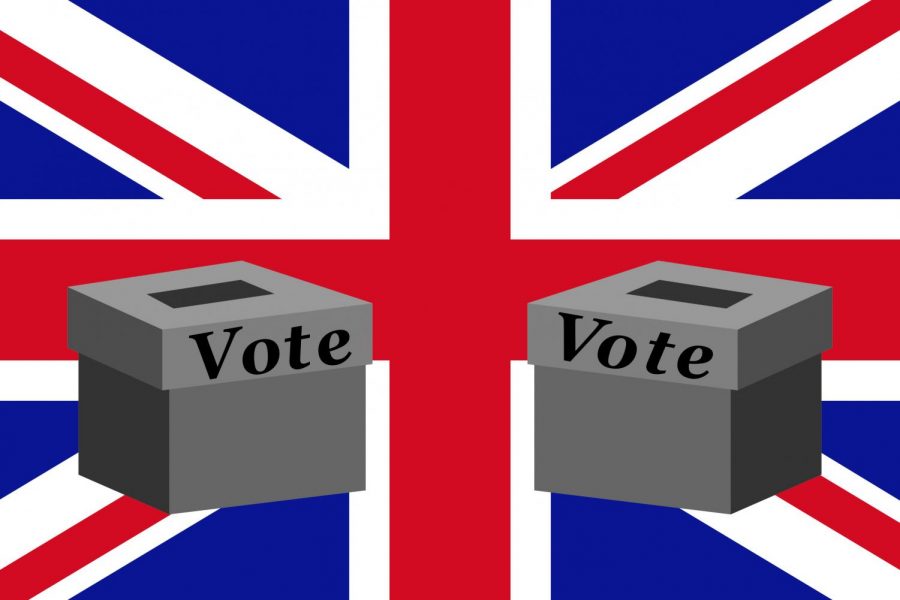The 2019 UK General Election Takes an Overwhelmingly Conservative Turn
BREXIT REACTION: The polling boxes of the 2019 UK General Election revealed a stunning upset by the Conservative Party, which now holds a vital majority in their parliament’s House of Commons.
January 30, 2020
On December 12, 2019, the United Kingdom Conservative Party took a sweeping victory at a parliamentary general election with Prime Minister Boris Johnson at the helm, firmly securing a strategic majority in the House of Commons.
According to the New York Times, the UK Conservative Party defeated their main political competitor, the Labour Party, to a House majority by earning 365 out of the 650 House of Commons seats. The Labour Party only secured 206 seats, which marked their worst election showing in more than 80 years. The party suffered dramatic constituency losses and saw many districts—even long-time political strongholds—flipped by the Conservative Party.
This election, like many in the UK’s history, was a tense political battle between the two largest parties in British politics, the Conservative Party and the Labour Party. Their most notable conflict is their opposing stances on Brexit with the Conservative Party supporting the secession and the Labour Party rallying against it. From the results of this election, many analysts agree that the rising popularity of Brexit among citizens of the UK caused a significant sway of support to the Conservative Party and skyrocketed their number of constituency wins.
Johnson and the Conservative Party ran on the motivation to “get Brexit done,” an ideology that appealed to the citizens that voted to leave the European Union back in 2016. Some of the areas where support for Brexit was fervent, such as northern and central England, overlapped with Labour Party strongholds, making it easy for the Conservative Party to flip these traditional Labour Party constituencies. Regarding the devastating lost the Labour Party suffered during this election, sophomore Tamzin Gervis said, “My stepfather is a member of the House of Lords [the royally appointed rather than elected chamber of Parliament]. He voted and campaigned for the Labour Party, and I would as well, but I think both the Conservative and Labour parties have much to blame to take for the muddy and dubious way they ran their campaigns on Brexit.”
Unexpectedly, this election also showed a rise in popularity of the Scottish National Party, which picked up 48 of Scotland’s 59 House of Commons seats. The SNP is pro-Scottish independence, and this election may be a signal of the region’s continued push for independence. Gervis says, “Scottish independence has always been an issue, but it has always been stopped in its tracks because of the economic disadvantage Scotland would have. In time, maybe they will break off from the United Kingdom, though.”
The UK, like the United States, has recurring time spans in which they must run elections. According to Parliament.uk, as of the Fixed-term Parliaments Act in 2011, the benchmark for general elections has been set at five years. Every five years, Parliament must be dissolved and the new members of Parliament become responsible for selecting the prime minister. However, it is possible for both Parliament and the royal family to call early elections.
The 2019 General Election was the result of a months-long struggle of the Conservative Party and Johnson to forcefully call an early election. Prior to this election, in the aftermath of former Prime Minister Theresa May’s resignation, the Conservative Party had lacked a majority in the Parliament House of Commons and were quickly losing seats despite a pact with the Democratic Unionist Party. In order to pass conservative policies and construct a plan for Brexit, the Party needed a majority in Parliament. However, this election is the third early election that has been called since the passing of the Fixed-term Parliaments Act and raises concerns with the public. Freshman Akash Sathi said these early elections are “… a massive concern. They make it appear as if the UK is disorganized, and that allies cannot rely on them. Allies, however, are extremely important to the UK, especially as they prepare to exit the EU.”
In most manners, the UK election system is vastly different than the Electoral College System that the United States uses. According to the BBC, the reason why the UK calls these “general elections” is that in the UK, citizens essentially elect both parliamentary representatives and the prime minister simultaneously. Voters elect the parliamentary representative of their district—called a constituency—and whichever party holds a majority in the House of Commons selects the Prime Minister from a number of candidates. The UK does not take into account national individual vote, but instead the collective vote of a constituency.
Due to this election, the UK government and its citizens will be sure to see a much more conservative agenda in Parliament, specifically the pushing of Johnson’s policy pledges from when he was inducted as prime minister in the summer of 2019. According to the Institute of Government, the top priority of Johnson and the Conservative Party’s is addressing the issues surrounding the nation’s exit from the EU, such as removing the incoming backstop on the border of North Ireland and the Republic of Ireland and increasing no-deal preparations, should the nation exit without a cooperation deal with the union. Junior Audrey Yip believes, “Now that conservatives have a majority in the House of Commons and Boris Johnson is prime minister, Brexit will be more efficient, but not any easier… Unless issues are addressed, it will probably worsen British relations with Europe and the rest of the world as Brexit will damage the UK economically.” The UK may also see the pursuit of changes in tax thresholds and the Stamp Duty Land Tax, the increase of public school spending, the increase of police personnel, a review of HS2, a government project for a high-speed light bullet train that would connect several of the UK’s largest cities, and a much-needed adjustment to the UK’s immigration policy. Regarding the immigration policy, Sathi said, “I don’t think that England can handle being without the EU, especially when it’s not so good with the handling of immigrants and refugees.”
Although the Conservative Party’s pursuit of Brexit was shut down in October of 2019, a new withdrawal date is set for January 31, 2020. With a new conservative majority and many issues to address before their exit, the UK has an extensive amount of conflicts to solve before they officially cut themselves off the EU and even then, the aftermath may prove disastrous.




